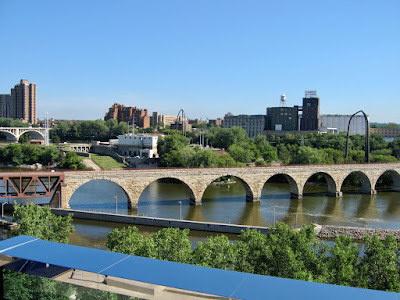Then, have you heard the rumors that, sometime near mid-afternoon around here, a huge, strange, bright, yellow light will appear in the Western sky? I, said the doubting Thomas, will believe it when, and if, I see it. Now, finally, let's look at how the corruption of language, e.g., hinterland, can contribute mightily to social issues.
 |
| once, urban grain silos made the linkage to farms obvious
Photo by J. Harrington
|
The aforementioned rain and clouds have given us more time than is advisable to sit and read and think. We've been rediscovering Wendell Berry and catching up with his more recent writings and writings about him. For example, there's a really interesting interview with Berry in the July 14, 2019 issue of The New Yorker. That and a number of other things have us once again thinking about cities, hinterland (does anyone else remember that term?) and urban-rural mutual dependencies (that are too often portrayed only as two sides of a divide). Wendell Berry is one of those who seem to be able to write faster and better than we can read. We recently, and belatedly, finished reading The Unsettling of America. We find we're in agreement with about 80% or more of what Berry writes but still struggle to understand how an agrarian culture fits with a global economy. Are they mutually exclusive? Berry farms with horses but drives a pickup truck. If, as we hope and suspect, fossil fuels have been a bridge to a renewable society, where and how does technological innovation arise in an agrarian economy? Or should we depend on serendipity such as the discovery of penicillin?
I've long loved cities, country and wilderness. I've developed an extreme aversion to suburbs. Christopher Alexander, in A Pattern Language, writes about interlocking fingers of farmland and urban land. It's been some time since I've seen consideration of regional land use patterns as an consideration in an urban-rural divide. Of course, it's been some time since Minnesota has had a state planning agency, too.
 |
| without rural-grown grain, what uses would mills and railroads serve?
Photo by J. Harrington
|
Something I believe I learned when I was active in the green building field is that all the elements, design, construction, materials, siting, operations and maintenance need to work together for the built environment to be truly sustainable. I also gained lots of insight into how challenging it is to get that kind of alignment and how rarely building owners and/or developers think that holistically. More to think about unless it stops raining, or snowing, for more than 20 minutes.
The Real Work
by Wendell Berry
It may be that when we no longer know what to do
we have come our real work,
and that when we no longer know which way to go
we have come to our real journey.
The mind that is not baffled is not employed.
The impeded stream is the one that sings.
********************************************
Thanks for visiting. Come again when you can.
Please be kind to each other while you can.
No comments:
Post a Comment